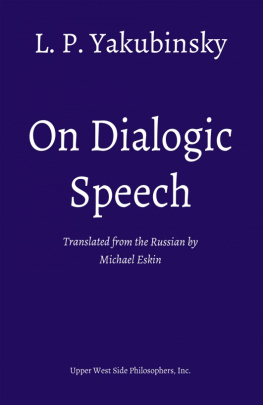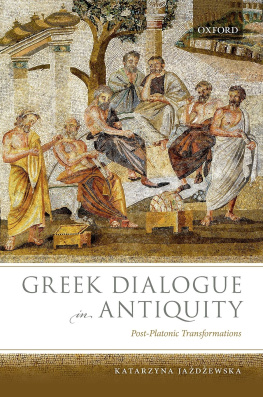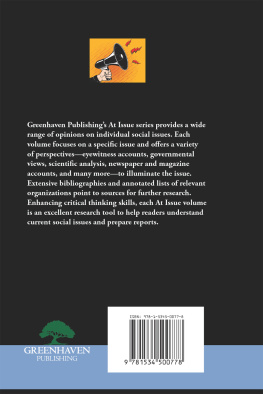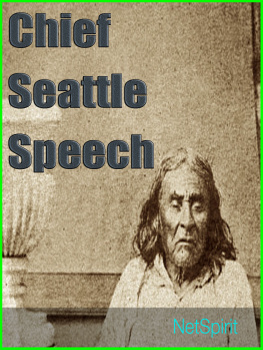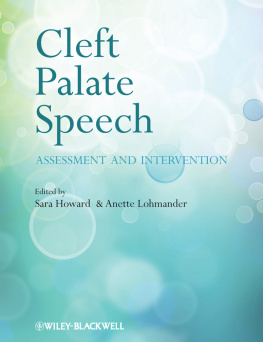Lev Petrovich Yakubinsky
ON DIALOGIC SPEECH
Translated from theRussian,
edited and with aForeword
by
Michael Eskin
Upper West Side Philosophers,Inc.

New York 2016
***
Upper West Side Philosophers, Inc.provides a publication venue for original philosophical thinkingsteeped in lived life, in line with our motto: philosophical living& lived philosophy.
***
Published by Upper West SidePhilosophers, Inc., P. O. Box 250645, New York, NY 10025, USA /www.westside-philosophers.com / www.yogaforthemind.us
English translation copyright 2015 by Upper West SidePhilosophers, Inc. First edition published in2016.
Smashwords Edition
978-1-935830-35-1
This ebook is licensed for yourpersonal enjoyment only. It may not be re-sold or given away toother people. If you would like to share this book with anotherperson, please purchase an additional copy for each recipient. Ifyou are reading this book and did not purchase it, or it was notpurchased for your use only, then please return to Smashwords.comand purchase your own copy. Thank you for respecting the hard workof this author
All rights reserved. No part of thispublication may be reproduced, stored in a retrieval system, ortransmitted, in any form or by any means, electronic, mechanical,photocopying, recording, or otherwise, without prior permission inwriting from the publisher. For all inquiries concerning permissionto reuse material from any of our titles, contact the publisher inwriting, or the Copyright Clearance Center, Inc. (CCC), 222Rosewood Drive, Danvers, MA 01923, USA(www.copyright.com).
The colophon is a registeredtrademark of Upper West Side Philosophers, Inc.
e-ISBN: 978-1-935830-35-1 / Thisbook is also available in print:
Library of Congress Cataloging-in-Publication Data:
Yakubinsky, Lev Petrovich, 1892-1945, author.
[O Dialogicheskoy Rechi. English]
On Dialogic Speech / translated from the Russian, edited and with aforeword by Michael Eskin.
pages cm
Published in 1923, O Dialogicheskoy Rechi is the first studydevoted entirely to the forms of speech in their concrete, socialand inter-subjective manifestations.
ISBN 978-1-935830-34-4 (alk.paper)
1. Discourse analysis, Literary. 2. Yakubinsky, Lev Petrovich,1892-1945--Translation into English. I. Eskin, Michael, translator.II. Title.
P302.5.Y3513 2016
40141.67--dc23
20150 31793
***
CONTENTS
***
Thus , On Dialogic Speech anticipates theBakhtin circles influential writings on thetransformative power of dialogue, as well as suchcontemporary disciplines and areas of academicactivism as socio- and cognitive linguistics, pragmatics,cognitive science, and cultural and postcolonial studies, insofaras the latter appropriate and strategically implement the conceptand potential of dialogue as a liberating force; moreover,Yakubinsky can also be said to describe and theorize, avant la lettre , ourcontemporary culture of texting, tweeting, messaging andemailing the twenty-first-centuryequivalents of passing notes (in class, meetings and so on),which the author singles out as a unique hybrid betweenmediated (written) and unmediated (properly dialogic)communication.
it is all the moresurprising that he has remained virtually unknown outside hisnative Russia an intellectual-historicallacuna that the present English edition of On Dialogic Speechseeks to fill.
*
*
Yakubinsky soon moved awayfrom the Formalists preoccupation with poetry and literature,however, and devoted himself to exploring the social dimension ofthe functions and forms of language in their phenomenalimmediacy. This move can be interpreted in at least three ways:(i) as a continuation of the work of his university teachers Jan A.Baudouin de Courtenay (1845-1929) and Lev V. Shcherba (1880-1944),both of whom insisted on the necessity tostudylanguage in its functional multiplicity and as a manifestationand expression of social interaction ; (ii)as a result of political developments during the early years of theSoviet Union and Yakubinskys joining the Communist Party, whichopposed Formalisms lack of interest in the ideological andpolitical significance of literature and art ( ironically, in coming down on the side of dialogue asopposed to monologue, On Dialogic Speech undermines its authorsostensibly pro-totalitarian ideological beliefs); (iii) finally,as a consequence of Yakubinskys theoretically and politicallymotivated opposition to Ferdinand de Saussures (1857-1913) hugelyinfluential work in linguistics, which had been gaining popularityamong Russian scholars since the posthumous publication ofhis Course in General Linguistics in 1915.
Yakubinsky objected to several ofSaussures basic postulates: to his insistence on theimpossibility of a revolution in language and, hence, theimpossibility of political action in and through language; to hispresupposition that the law of fate rules linguistic evolutionand change, which cannot be voluntarily and consciously effected by(individual) speakers; to his abstract notion of a social mass ofspeakers and his disregard for the concrete interaction betweenspeakers; finally, to his fundamental claim as to thearbitrariness of the sign and his concomitant contention thatlinguistic and lexematic preferences lack motivation. And althoughYakubinsky did not explicitly publicize these objections until theappearance of his essay F. de Saussure on the Impossibility of aPolitics of Language in 1931, in which he condemns Saussuresoverall abstract formal-logical approach and his blindness towardthe concrete reality and intricateness of individual andcollective linguistic activity, On Dialogic Speech can already beread as a blueprint for a non-Saussurean approach to language andsociety.
*
Last but not least, On Dialogic Speech canalso be viewed as articulating a counterposition to the so-calledlinguistic turn in the humanities at the beginning of thetwentieth century. While thinkers such as Gottlob Frege, BertrandRussell and Ludwig Wittgenstein were elaborating theall-encompassing role of language in our relation to reality, theworld and ourselves, Yakubinsky emphasized the importance ofattending to the extra-linguistic, external and internal,conditions determining our use of language. In other words, ifWittgenstein famously contended that the boundaries of ourlanguage are the boundaries of our world, then Yakubinsky can betaken to suggest that the boundaries of our psycho-physiological,material existence are the boundaries of our language.
*
The present translation ofOn Dialogic Speech is an abridged version of Yakubinskysoriginal essay. For the contemporary English readers convenience,those passages have been omitted or shortened that reiterate,repeat or provide additional illustrations for points already madewith sufficient clarity (such as Yakubinskys partial retelling ofGuy de Maupassants novella Family Life in part 7); extensivelyengage with untranslated scholarly works by Yakubinskys Russiancontemporaries for purposes of scholarly method and additionalevidentiary corroboration; recap or polemicize against othersresearch and arguments that are merely tangential to Yakubinskysown (such as an extensive summary, in part 1, of Aristotlesdiscussion of poetry and metaphor in Poetics ).
Human speech assumes a variety of forms. Itsdiversity manifests itself not only in the existence of innumerablelanguages, dialects and idioms including the jargons of differentsocial groups and individuals but also within any givenlanguage, idiom or dialect (even within the idiolect of a singleindividual), and it is functionally determined by a complex networkof factors that must be taken into account in any attempt to studylanguage in its phenomenal immediacy, and to explain its genesisand history.
Next page
